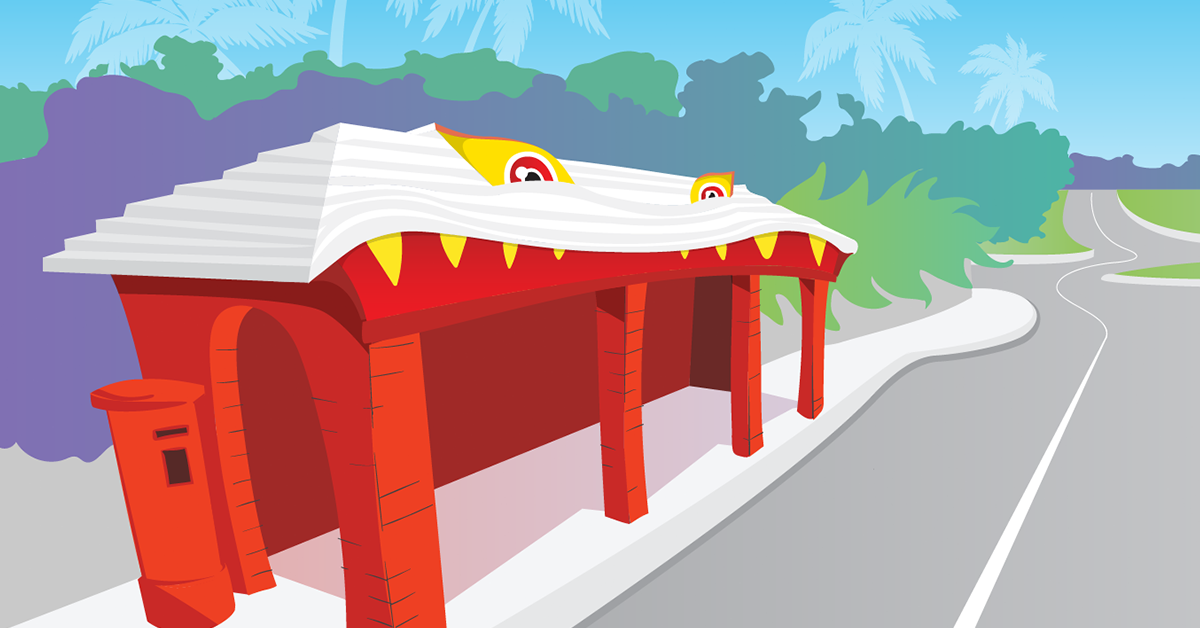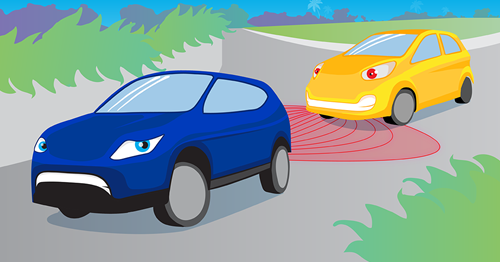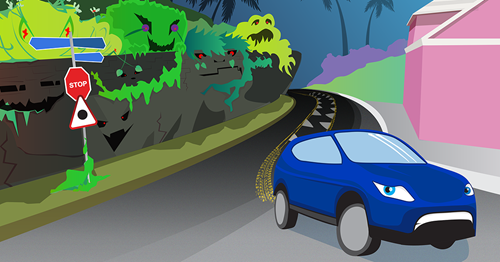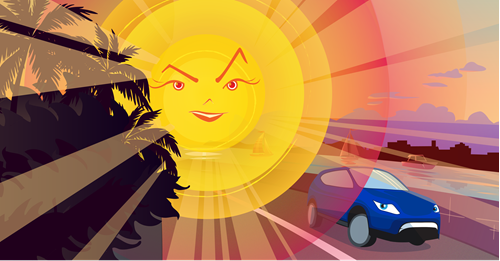
It’s hard though. Drive around enough times without incident and you get used to the idea of, well, not crashing. In fact, in Bermuda the average person is involved in 1 collision every 10 years* (if at all). However all it takes is one distraction while driving to disrupt your life.
So here’s something to think about. Imagine that all these common distractions are out to get you. They want to get under your skin; they’ve got a mean little agenda and are willing to poke at you until you make a mistake. They’re effective too —on average, you’re going to be paying hundreds to thousands of dollars for even a basic fender bender right out of your own pocket – easily a month’s rent in Bermuda! That’s right, these guys could make you late on rent if you’re not careful.
Don’t rent? Well how about this: the time wasted in the claims process from filing the report to the repair of your vehicle quickly adds up, not to mention the inconvenience of it all. Just think, the process could add up to hours of prime premier league viewing, wasted! Besides, having no transport to get around town is no fun either. Not cool, distractions. Not cool.
Meet the distractions that account for the most car insurance claims
They come in all shapes and sizes, and simply thinking about these sneaky distractions will actually help you avoid them. Sounds backwards, but psychology's weird like that sometimes!
The two culprits that we want to highlight are Magnetic Bumpers and Space Invaders. According to research conducted by Argus, these two account for 1 in every 5 collisions in Bermuda with an average cost of $5,000 per accident**.
Magnetic Bumpers (Safe Stopping Distances)
Car bumpers are actually there to help reduce damage, but for whatever reason, they tend to have a natural attraction to one another. It’s so easy to let the two-second rule slip, even when you don’t mean to be tailgating.
There are a lot of charts out there that demonstrate the craziness of a few extra miles per hour, and here's an eye opening video from Australia.
Next time you’re driving, try and get a sense of how magnetic the bumpers on your car seem to be, and notice how close others’ bumpers are to one another. As mentioned before, simply being aware of these minor things helps you to make the necessary changes - a major strategy for defeating them.

Space Invaders (Sharing the road)
You know how some people can get into your personal space? We think your car is plagued by these too. Pesky cyclists, aggressive drivers, and haphazard pedestrians are all part of a group referred to as Space Invaders.
We’ve got two basic ideas that will help: don’t be a Space Invader, and keep calm when your space does get invaded.
The first one seems obvious, but we’re not only talking about when you’re driving a car. If you’re on a bike, then you still play the role of a potential Space Invader. Keeping in mind that every car needs ample personal space when it’s moving is our way of tackling Space Invaders.
But what about when – and of course it will happen – other people aren’t so courteous? You probably guessed it: defensive driving is your friend. If you’ve not looked into defensive driving (it goes well beyond the basics), it’s worth your time. Google it!
Limited time? These two articles do a fine job covering the key points: #1 (UK), #2 (US). And while it goes without saying, we’ll say it anyway because it really makes a difference: keep a cool head when others invade your space. Space Invaders feed off anger and want you to exact revenge. Don’t fall for it!

Other distractions that lead to Car Insurance Claims
Other distractions: The Evil Intersection
A blind turn. Bad signage. Maybe a roundabout that no one seems to be able to navigate properly, or a protruding bus layby. There’s always a place that will be all too happy to lead to a collision if you’re not paying attention. Be aware of these locations and approach them with patience to defeat them.

Other distractions: Mother Nature
She gives and she takes away. Usually Mother Nature is a wonderful thing, but you don’t have to look far to find stories about her deadly side. Alone or paired up with any of the above distractions, she can use a torrential rainstorm or a simple sunbeam to cause chaos in your life. Caution is key – slow down, take your time and grant her due respect.

Other distractions: Father Time
He can make getting from Point A to Point B slower, which makes you want to go faster. It could be that annoying stop-n-go, or someone else on the road who’s really concerned about staying five under the limit. A situation where you want to pass, but can’t. It’s all really about time, right? Planning ahead and allowing extra time to get to where you need to be is a sure way to avoid his sneaky spell.
The Argus stake in road safety – community wellness and reducing insurance claims
Now why would an insurance company write about road safety, and turn bikes and bus stops into strange monsters? Then pay to promote said monsters? (We even made ads!)
Insurance is a strange business: everyone’s actually better off if we provide our claim service less often (everyone, including the business!) Reducing collisions means fewer claims which help us keep prices down –ultimately lowering the cost of motoring for everyone.
Fewer claims mean that fewer people are ending up in unfortunate situations. While we’re happy for the opportunity to provide a world-class service in the event that you end up in a bad situation… well, it’s much better for you if you never do.
So, we write articles like this and encourage our local community to take part.
Drive safe for you and your community’s sake
It’s a lot easier to avoid the big ones like drinking and driving, street racing, or any number of really foolish things that some people do. But even the best of us can let these subtle, sneaky distractions creep into our lives.
The first step is to remember that they exist and how they like to cause chaos! Do that, and you’re one step closer to protecting not only yourself and your vehicle from harm but also, just as importantly, those around you.
*Based on our experience over the last 12 month period.
**According to research conducted by Argus over the period of the last 12 months.







